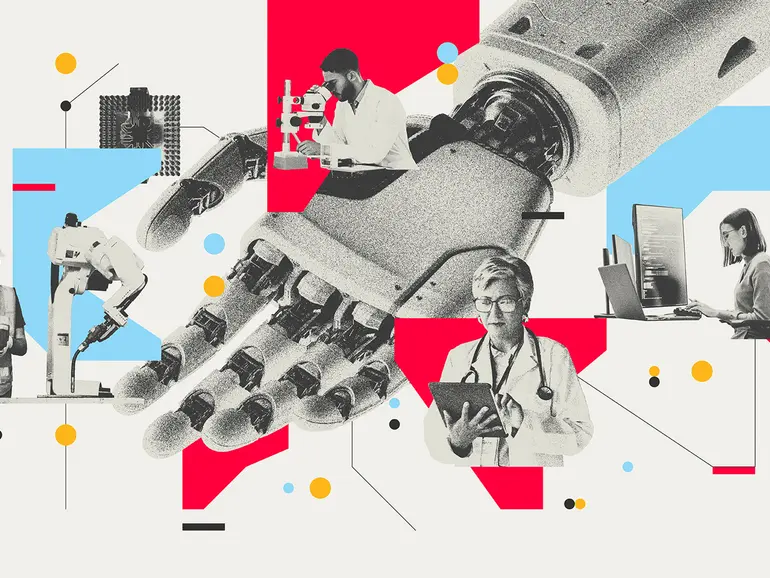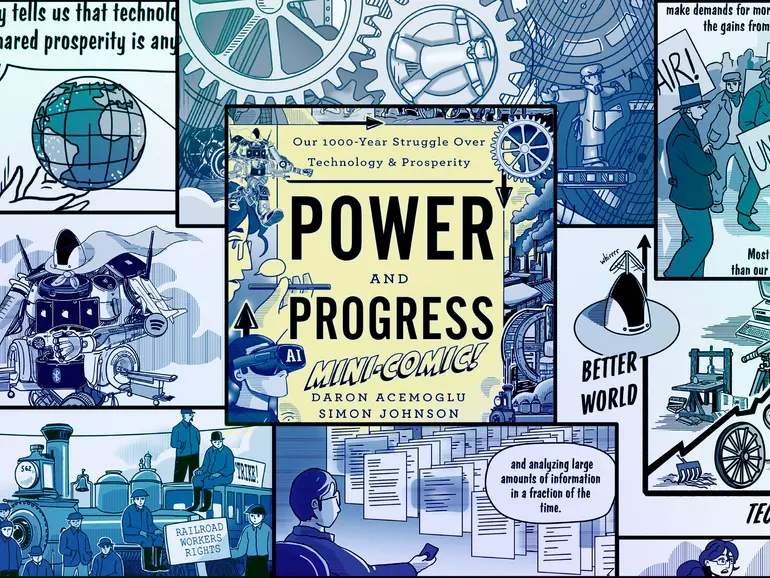Choose the human path for AI
To realize the greatest gains from artificial intelligence, we must make the future of work more human, not less.

Faculty
SIMON JOHNSON is the Ronald A. Kurtz (1954) Professor of Entrepreneurship at the MIT Sloan School of Management, where he is head of the Global Economics and Management group. At MIT, he is also co-director of the James M. and Cathleen D. Stone Center on Inequality and Shaping the Future of Work and a Research Affiliate at Blueprint Labs.
In December 2024, Johnson received the Sveriges Riksbank Prize in Economic Sciences in memory of Alfred Nobel, joint with Daron Acemoglu and James A. Robinson, “for studies of how institutions are formed and affect prosperity.”
In December 2025, Johnson was named an “AI Ambassador” by the British government. In this capacity, he assists with the Tech Town initiative and other efforts to develop technology applications that boost productivity and share prosperity.
In 2007-08, Johnson was chief economist and director of the Research Department at the International Monetary Fund. He currently co-chairs the CFA Institute Systemic Risk Council with Erkki Liikanen. He is a Research Associate at the NBER and a Fellow at CEPR.
Johnson’s most recent book, with Daron Acemoglu, Power and Progress: Our 1000-Year Struggle Over Technology and Prosperity, explores the history and economics of major technological transformations up to and including the latest developments in Artificial Intelligence. Power and Progress has been published in about 20 languages around the world. It was long listed for the 2023 Financial Times and Schroders Book of the Year and for the Baillie Gifford Prize for Non-Fiction, and it was shortlisted for the 2024 Lionel Gelber Prize. Johnson draws on this research as an unpaid adviser to the British government on the question of how Artificial Intelligence can be used to create more good jobs and boost shared prosperity.
His previous book, with Jonathan Gruber, Jump-Starting America: How Breakthrough Science Can Revive Economic Growth and the American Dream, explained how to create millions of good new jobs around the U.S., through renewed public investment in research and development. This proposal attracted bipartisan support, as reflected in the 2022 Chips and Science Act.
Johnson was previously a senior fellow at the Peterson Institute for International Economics in Washington, D.C., a cofounder of BaselineScenario.com, a member of the Congressional Budget Office’s Panel of Economic Advisors, and a member of the Federal Deposit Insurance Corporation’s Systemic Resolution Advisory Committee. From July 2014 to early 2017, Johnson was a member of the Financial Research Advisory Committee of the U.S. Treasury’s Office of Financial Research (OFR), within which he chaired the Global Vulnerabilities Working Group. From February 2021 to March 2025, Johnson was a member of the board of directors of Fannie Mae, where he was at various times vice chair of the audit committee, vice chair of the compensation committee, and a member of the risk and capital committee. Building on this extensive experience, Johnson is currently (unpaid) co-chair of the academic advisory board for Better Markets, an organization that advocates for more effective financial regulation and higher levels of loss-absorbing equity capital for banks.
“The Quiet Coup” received over a million views when it appeared in The Atlantic in early 2009. His book 13 Bankers: the Wall Street Takeover and the Next Financial Meltdown (with James Kwak), was an immediate bestseller and has become one of the mostly highly regarded books on the financial crisis. Their follow-up book on U.S. fiscal policy, White House Burning: The Founding Fathers, Our National Debt, and Why It Matters for You, won praise across the political spectrum. Johnson’s academic research papers on long-term economic development, corporate finance, political economy, and public health are widely cited.
“For his articulate and outspoken support for public policies to end too-big-to-fail”, Johnson was named a Main Street Hero by the Independent Community Bankers of America (ICBA) in 2013. In 2024, the work of Johnson and his colleagues during the COVID pandemic was recognized by the Nursing Home Association of Massachusetts. And on July 4th, 2025, the Carnegie Corporation of New York honored Johnson as one of its Great Immigrants, “an extraordinary group of immigrants who have made notable contributions to the progress of American society.”
Johnson has a B.A. from the University of Oxford, an M.A. from the University of Manchester, and a Ph.D. from MIT. He held a post-doctoral fellowship at Harvard University (1989-91) and was junior faculty at Duke University (1991-96). In 2025 he was elected an honorary fellow of Corpus Christi College, Oxford, where he studied as an undergraduate, 1981-84. In December 2025 he was elected a member of the Royal Economic Society.
Important: For all media inquires, please make sure you copy Michelle Fiorenza, fiorenza@mit.edu
Photo: Malin Lauterbach / EFN
Johnson, Simon, Lukasz Rachel, and Catherine Wolfram, Working Paper. August 2025. NBER Working Paper No. 31347.
Acemoglu, Daron and Simon Johnson. Annual Review of Economics Vol. 16, No. 597-621 (2024).
Johnson, Simon and Catherine Wolfram. Brookings Institution Working Paper (2024). Appendix.
Johnson, Simon and Daron Acemoglu. Project Syndicate, January 2, 2024.
Acemoglu, Daron and Simon Johnson. Project Syndicate, December 15, 2023.
Capraro, Valerio, Austin Lentsch, and Daron Acemoglu et al., Working Paper. December 2023.

To realize the greatest gains from artificial intelligence, we must make the future of work more human, not less.

Download “Power and Progress: The Mini-Comic!” for free. A new comic book adapts MIT Nobel Prize-winning economists’ work on how AI affects workers and shared prosperity.
The Trump administration says it may move ahead on at least a partial reprivatization of Fannie Mae and Freddie Mac. What's at stake is a lot of money, according to professor Simon Johnson. "If it's done wrong, then you could create risks for the government in the future." He says a misstep could drive up the interest rate that people have to pay on 30-year, fixed-rate mortgages.
In their book "Power and Progress," professor Simon Johnson and Institute Professor Daron Acemoglu narrate the calamitous failure of the French Panama Canal project in the late 19th century. The problem, Johnson and Acemoglu write, was that the vision for progress did not include everyone — and failure to incorporate feedback from others resulted in poor quality decision making.
In this podcast episode, professor Simon Johnson explored why automation has historically failed to deliver shared prosperity and why artificial intelligence may be following the same path.
In this opinion piece for VoxEU, professor Simon Johnson, professor of the practice Gary Gensler, and co-authors wrote: "President Trump was elected, in part, on the promise of helping people lower down the income scale. Under his second administration, though, income and wealth gaps have only widened – and his policies are likely to further widen the gap."
This eight-week online program offers you the opportunity to explore macroeconomics from a business perspective, guided by renowned economist Professor Roberto Rigobon.
Over six weeks, you’ll explore the technical and strategic considerations for robust, beneficial, and responsible AI deployment. You’ll examine the various stages of a proprietary ML Deployment Framework and unlock new opportunities by investigating the key challenges and their related impact. Guided by leading experts and MIT academics, you’ll build a toolkit for addressing these challenges within your own organization and context.